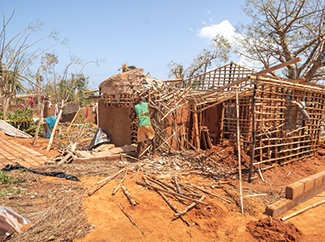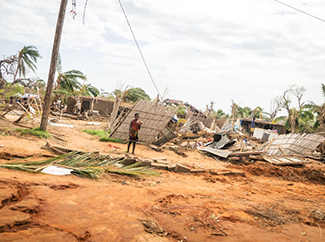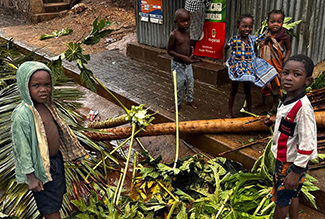consent_cookie
Duración: 1 year
Stores the user's cookie consent state
20-12-2024
Humana and its local partner ADPP Mozambique have started a humanitarian response plan to support people affected by Cyclone Chido. For this reason, the Foundation is launching a support campaign this Saturday, December 21, to raise emergency funds to articulate this response, which will be based on the distribution of clothing and footwear among the affected communities in the north of the country.
On December 15, Chido reached Mozambique at around 4 a.m., with winds of 180 km/h and gusts of 220 km/h. In Cabo Delgado, Nampula, Zambézia and Niassa, rainfall was 200 mm per square meter.
The areas that are suffering the most from the consequences of Chido are Pemba, Mecufi, Chiure and Ancuabe, in Cabo Delgado, and Memba and Erati in Nampula.
The affected population is currently around 200,000 people, of which 128,000 are in the province of Cabo Delgado. In Nampula, there are around 46,000. Initial reports speak of 34 people dead.
The ADPP Mozambique team is still assessing the consequences of the devastating passage of Chido through the communities in which it works in order to try to offer an immediate response. For the moment, it has been confirmed that the distribution of clothing and footwear among the affected population will begin as soon as possible.
Chido has arrived on the coasts of Mozambique after its devastating passage through the Mayotte archipelago, located between Madagascar and the Mozambican coast itself. Mayotte is a department of the region of France. Certain areas of Malawi and Zimbabwe have also been affected.
You can make your donation by clicking here
Thank you very much for joining this campaign to support the people affected by Cyclone Chido!
Immediate effects of Chido
Chido is currently causing the loss of human lives, significant damage to homes, schools, health centres and roads, displacement of the population to temporary accommodation centres and difficulties in covering basic needs such as food and basic necessities such as clothing, hygiene products and sanitation.
At the moment, the number of houses destroyed amounts to 24,000 and those damaged, to around 12,000. In Cabo Delgado there are districts, such as Mecufi, where it is estimated that 100% of the houses have been damaged and few structures remain standing.
In Nampula, the districts of Memba and Erati are the most affected. Schools and hospitals have been destroyed by Chido. A cholera outbreak identified in the area prior to the arrival of the cyclone may worsen due to heavy rains.
In the medium term, people are also faced with the suspension of classes, restricted access to health services, potential outbreaks of waterborne diseases such as cholera and malaria, and loss of livelihoods such as crop fields and small livestock and fish farms.
Increase in extreme weather events due to global warming
In the past decade, climate shocks have intensified extreme weather conditions in eastern and southern Africa. Cyclones that devastate communities, such as Chido, are becoming more frequent. Cyclone Freddy, for example, hit Mozambique in 2023. Idai did so in 2019.
According to UNICEF, almost 3.3 million people are also expected to be in a situation of “crisis” or increased food insecurity in Mozambique next year due to the impact of El Niño. Meanwhile, La Niña weather patterns may worsen conditions in 2025.
Humana and humanitarian action, from immediate response to socioeconomic recovery of affected communities
In recent years, Humana has increased its efforts to support local communities through response, recovery and disaster risk reduction interventions, particularly in areas affected by Cyclone Freddy in Malawi and by Cyclone Idai in Mozambique and now by Chido.
The main focus in these cases is to improve the living conditions of affected people, providing emergency response to cover basic needs of the population, including forcibly displaced people and those in camps or temporary accommodation centres.
Humanitarian action interventions aim to improve housing conditions, ensure food security, promote good hygiene practices and work to protect the rights of the most vulnerable groups.
After the immediate response phase, our efforts focus on fostering socio-economic recovery. To do this, we work with communities to revitalize people's livelihoods, agricultural activities and establish strong social safety nets.
This approach based on the triple nexus of humanitarian action, development and peace aims to better respond to the increasing complexity and duration of forced displacement and the worsening effects of climate change, thus working to not only respond to humanitarian crises by addressing the most basic needs of the population but also to reduce vulnerability and strengthen the resilience of communities.
You can make your donation by clicking here
Thank you very much for joining this campaign to support people affected by Cyclone Chido!
Remember that donations to Foundations have tax advantages. You can find all the information about this here.
The photographs that illustrate this news have been provided by UNICEF


